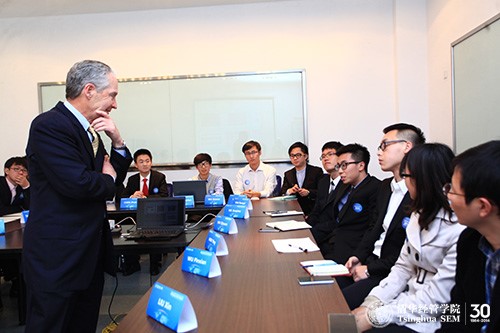On October 23, 2014, 11 members of Tsinghua University School of Economics and Management’s Advisory Board stepped out of the boardroom and into the classroom. Each member led a 90 minute lecture with a group of 20 to 40 students. This was then followed by an informal discussion about the lessons over dinner. This was a rare and unique opportunity for Tsinghua SEM students across all levels—undergraduate, masters, MBA, PhD—to interact directly and candidly with the leaders of today’s top global companies including Qualcomm, Flextronics, and The Carlyle Group. The following are highlights from the classroom sessions led by Chris Galvin and Jim Breyer.
Christopher B. Galvin
Chairman, CEO and Co-Founder of Harrison Street Capital LLC
former Chairman and CEO of Motorola Inc.

Mr. Galvin began the session with a presentation on innovation. He emphasized that people, especially experts, will almost always say “no” to innovative ideas. On this topic, he told a story about raising his first fund at Harrison Street Capital. Instead of feeling discouraged after a major institutional investor rejected his fund, he was excited and energized—he viewed the rejection as a sign that he was onto something new. He advised students to never take “no” for an answer if they are passionate about their ideas.
When asked about his controversial dismissal from Motorola in 2003, Mr. Galvin compared it to a car accident: “it happens.” The Galvin family was disappointed by the board’s decision—the company was founded by Mr. Galvin’s grandfather in 1928, and was in the midst of completing its most significant turnaround in history—but what’s done was done. Mr. Galvin told students that during dire and disastrous times, it’s most important to be resilient. In order to rebound, one must be able to look at the situation objectively, and take the opportunity to do some serious, creative soul searching. Mr. Galvin eventually found his new path in real estate investment management.
Mr. Galvin continued the discussion over dinner, during which he shared stories from his family’s first trip to China in 1987. He recounted one incident in which his father, much to the horror of their advisors, bluntly told a senior Chinese government official that his idea to shut the borders and develop a TV monopoly was a “bad idea.” But by speaking openly and sincerely, the Galvins were able to build stronger bonds of trust with local officials at the time. Motorola successfully entered China in the early 1990s, long before most multinational companies.
Jim Breyer
Partner at Accel Partners

A highly regarded VC – Forbes ranked him #1 on its Midas list for a consecutive 3 years since 2011. He is also one of the earliest major investors in Facebook as well as many successful consumer internet, media and technology startups such as Etsy, Circle Financial and Legendary Entertainment. Mr. Breyer is now focusing on his own Breyer Capital, an innovative investment and venture philanthropy firm.
Mr. Breyer briefly introduced his early life, which had a great impact on him (his parents fled Hungary in 1956) and explained that he had always wanted a career that combined his interest in science and mathematics with his passion for art and recruiting people. When he finished his graduate study at Harvard, he decided to join a VC firm so that he could explore various businesses before he started his own. But he’s remained a VC ever since. “There are people who enjoy making 10 to 12 important operating decisions a day, and they make great managers. I realized I may make 10 to 12 important decisions a year, but I like to think about what may happen 10 to 12 years from now,” he explained. He advised entrepreneurs to look for VCs that can stay with them through difficult times, and has the ability to recruit the best talent for their team.
In the much-anticipated Q&A section, students were interested to find out how Mr. Breyer identifies and evaluates “good” companies to make investment decisions. He stressed that talent, team and product are essential for the success of all startup companies. But he also revealed to students that Accel uses a different set of criteria to evaluate Chinese startups. “If a Chinese entrepreneur doesn’t talk about getting rich, it’s unlikely we’ll back them.” When asked if budding student entrepreneurs should leap into the unknown and start a company, or seek employment with a VC or an established company, he gave clear and direct advice. “If you have a good idea, and you believe in it strongly and passionately, do a startup immediately.”
Editor’s note: Below is the complete list of 11 Advisory Board members who participated in this year’s classroom sessions, please check the SEM intranet for more stories:
● Jim Breyer (Accel Partners)
● Henri de Castries (AXA Group)
● Christopher B. Galvin (Harrison Street Capital LLC, formerly Motorola)
● Maurice R. Greenberg (C.V. Starr & Co., Inc. formerly AIG)
● Nobuyuki Idei (Quantum Leaps Corporation, formerly Sony Corporation)
● Irwin Mark Jacobs (Qualcomm)
● LI Rongrong (State-Owned Assets Supervision and Administration Commission)
● Mike McNamara (Flextronics)
● LIU Mingkang (China Banking Regulatory Commission)
● David M. Rubenstein (The Carlyle Group)
John L. Thornton (Brookings Institution, Barrick Gold Corporation)
From Amy Ly,GMBA Class of 2016